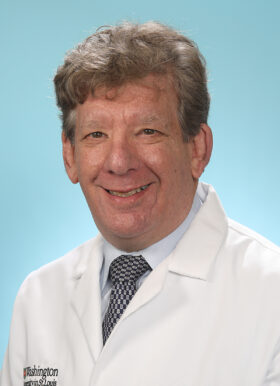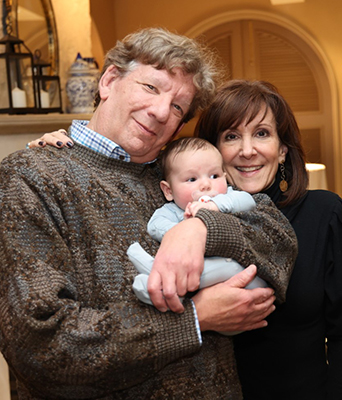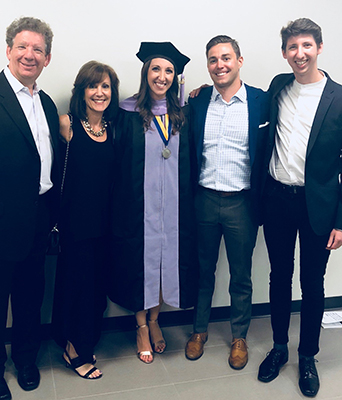Stephen Wexler, MD

Stephen Wexler, MD, is an ophthalmologist and one of the most respected LASIK (laser assisted in-situ keratomileusis) surgeons in the Midwest. LASIK can be a safe and effective treatment for nearsightedness, farsightedness and astigmatism, eliminating the need for contacts and glasses.
For an appointment, please call 855-735-2745 or schedule online. To learn more, visit LASIK Vision Surgery.
What happened in the course of schooling to influence you to choose your specialty?
As a second-year medical student, we had a two-week lecture series on ophthalmology. After those two weeks, I knew I wanted to go into ophthalmology. The specialty had everything I was looking for — high technology, office-based care and intricate and interesting surgeries.
At that point, I was full-on dead set to be an ophthalmologist and arranged to take an ophthalmology elective in my third year of medical school. I started doing research in ophthalmology, which culminated in me presenting a paper at the American Academy of Ophthalmology as a first year resident.
In fact, I probably made things harder for myself because I was so enthusiastic, I talked several of my classmates into going into ophthalmology. We had many people who applied to residency my year – probably making it more competitive to get a spot.

Had you always known you wanted to be a doctor?
I was always a science guy in high school, sort of the go-to person for science questions.
I remember we did a school play in high school called Our Town, which many schools do. I was typecast as Dr. Gibbs, and from that point on, many of my friends referred to me as Doc. So you might say I was pegged pretty early to go into medicine!
What brought you to Washington University?
When I came to St. Louis in 1986, I joined Dr. Jack Kays and Dr. Harry Knopf in private practice in Clayton. Our practice actually had been started in 1895 and all the previous doctors had had a strong affiliation with Washington University. I immediately was asked to be on staff at Barnes, and became a clinical instructor in the department, in charge of staffing residents in the resident clinic.
I taught cataract surgery at the VA Hospital. When LASIK came into being in the late 1990s, I developed an interest in that procedure. From that point on, most of my teaching was directed towards LASIK. I would have the residents and fellows spend days with me doing refractive surgery.
After 35 years of being a clinical instructor, I had an opportunity to change affiliations from my previous position and became a full-time faculty member at Washington University. It was a perfect fit — a win-win situation for both the ophthalmology department that was looking for a refractive surgeon, and for me at this point in my career. I will be able to emphasize patient care, teach and do research.
Which aspect of your practice do you find most interesting?
I love taking care of patients. But as far as being the most interesting, I love the technology. It’s been fascinating to watch laser technology evolve over the past 20 years and to have been involved in that development.
I look at what we are doing today for LASIK surgery and think about what we did 10, 20 years ago –and it’s a world of difference. The technical side of delivering the laser energy and the software used to program the laser has all been an interest of mine.

What has been the biggest change since LASIK was introduced?
The outcomes of LASIK are measured by how many people end up with 20/20 vision without glasses. These outcomes have continually improved over the last 20 years and can be traced back to one thing – laser technology.
Initially, we used a blade and an instrument called a microkeratome to make the flap in LASIK. In 2005, I was the first in St. Louis to use a femtosecond laser to make the flap without a blade, and we’ve never looked back.
This advancement not only improved outcomes, but it increased safety. The excimer laser is what delivers the actual correction to the eye by reshaping the cornea. Over the years, we’ve gone from a very rudimentary laser ablation to today’s topography-driven ablation. These advances are why we are continuously getting better visual results, with fewer patients needing a touch-up surgery or enhancement.
How would you describe a good candidate for LASIK?
A good candidate for LASIK must have healthy eyes. My number one goal is to do these procedures as safely as possible. If a patient has an underlying systemic condition, or an underlying eye problem that could increase the risk of having their LASIK surgery, I say it’s better to stay in your glasses and contacts.
It is important to remember this is an elective procedure. I do have some disappointed patients when I tell them they are not a candidate. A good candidate means the patient needs to have a normal shaped cornea and a thick enough cornea – in addition to not having any underlying health problems that could affect the outcome.
We have developed new technology for improved preoperative evaluation of corneas. This allows us to make sure patients are a good candidate for LASIK.
Safety is my number one concern, and if I don’t think it’s the right procedure for my patient, I will talk about other options.
Where are you from?
I grew up in Flint, Michigan, and had a very interesting high school experience. I went to a small innovative high school that was based on a school in England called Summerhill. Their philosophy was having small class sizes and students who were individually motivated. There were no letter grades in our school — which was very innovative for the times. I flourished in that setting.
After graduating from high school, I went on to the University of Michigan. The alma mater of both my parents and my two older sisters. So, it was pretty much a done deal that I was going to go to University of Michigan, no matter what. Both my children went there, as well. The first thing we bought our new grandson was a Michigan t-shirt — let’s just say our family bleeds maize and blue.
Is there a particular award or achievement that is most gratifying?
As I mentioned, I’ve been on clinical staff at Washington University for a long time. In 1996, and again in 2018, I was awarded the clinical teacher of the year from the Department of Ophthalmology. I am very proud of that.
What is the best advice you’ve received?
The best medical advice I received was from a professor at the University of Wisconsin, where I did my residency. That advice was when you walk into an exam room, let the patient talk. If you ask an open-ended question, and let the patient tell you what’s wrong — 9 times out of 10 he or she will give you’re the diagnosis. I still believe in that.
If you weren’t a doctor, what would you like to be doing?
I would have loved to be a musician. But unfortunately, I was lacking in one thing – talent. I did play electric guitar in high school and college, and belonged to a band. But other than playing in a few garages and a few bars, we didn’t go very far. I do still love music.
Anything else you like to do for fun?
I am a golfer. So I do try to get out there once a week during the summer. It is an incredibly frustrating sport, but there are so many aspects to it I do enjoy, and I love being with my friends.